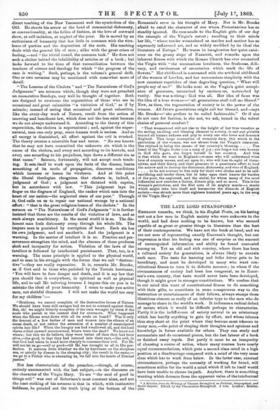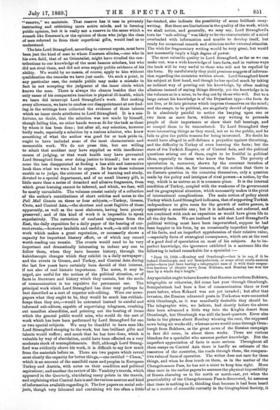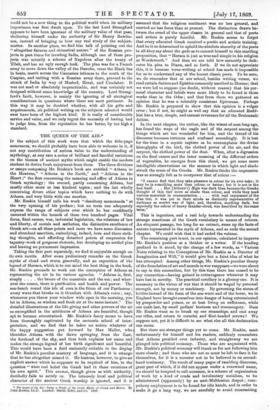THE LANE LORD STRANGFORD.*
E2011160/f remarks, we think, in his English Traits, on his having met not a few men in English society who were unknown to the world, and had done nothing to be known, but who seemed capable-of as great or greater things in literature than the best of their contemporaries. We have not the book at hand, and we are not sure of representing exactly Emerson's thought, but our impression is that his feeling was one of surprise at the amount of unrecognized information and ability he found concealed among us. Yet an old and rich country, where there has been a cultured society for generations, is always likely to contain such men. The taste for learning and belles lettres gets to be hereditary, and must be developed in many who want con- stitutional fitness to turn it to definite account ; in whom if the circumstances of society had been leas congenial, as in Enier- son's own country, that taste would never have been developed, though it might grow in stronger constitutions. We confess that to our mind this want of constitutional fitness to do something with their gifts, to contribute in some conspicuous way to the instruction or entertainment of their fellows, always stamps these illustrious obscure as really of an inferior type to the men who do manage to share in the world's work. It indicates a radical defect of nature which it would be difficult perhaps to characterize. Partly it is the indifference of satiety natural in an aristocracy which has hardly anything to gain by effort, and whose labours thus stop short at the point where they become most irksome to many men,—the point of shaping their thoughts and opinions and knowledge in forms available for others. They can study and accumulate and do occasional pieces, but the last labour of a book or finished essay repels. But partly it must be an incapacity of choosing a course of action, where many courses have nearly equal recommendations, which puts a second-class mind in a high position at a disadvantage compared with a mind of the very same class which has to work from below. In the latter case, external circumstances, perhaps the necessity of working for bread, will sometimes utilize for the world a mind which if left to itself would have been unable to choose its path. Anyhow, there is something wanting which detracts from the apparent value of the intellectual A Gelection from the Writings of Viscount Mrangford, on Political, Geographical, and &dal &Wed& Edited by the Viscountess Btraneford. 2 vols. London ; Bentley. 1869.
"reserve," we maintain. That reserve has it uses in privately instructing and criticizing more active minds, and in forming public opinion, but it is really not a reserve in the sense which a remark like Emerson's, or the opinion of those who judge the class of men referred to from their superficial gifts, would lead us to understand.
The late Lord Strangford, according to current repute, must have been just the kind of man to whom Emerson alludes,—one who in his own field, that of an Orientalist, might have rivalled the con- tributions to our knowledge of the most famous scholars, but who did not rival them, and did not even supply public evidence of his ability. We would by no means, of course, apply to him without qualification the remarks we have just made. On such a point, in any particular case, the outside public may make a mistake in fact in not accepting the judgment of the inner circle which knows the man. There is always the chance besides that the only cause of his comparative inaction is physical ill-health, which we learn did interrupt Lord Strangford's work. But making every allowance, we have to confess our disappointment at not find- ing in the writings here collected the evidence of those talents
which an inner circle attributes to Lord Strangford. It is a mis- fortune, no doubt, that the selection was not made by himself,
though failing him, no other hands were so fit for the task as those by whom it has been done ; but after all, any selection, however badly made, especially a selection by a zealous admirer, who knew something of what the author was good for or took pride in, ought to have included some of the most characteristic and memorable work. We do not press this, but are willing to admit that accident may have supplied us with insufficient means of judging, or that weak health may have prevented Lord Strangford from ever doing justice to himself; but we are none the less disappointed at finding a less able and instructive book than what we were led to expect. So fax as these volumes enable us to judge, the outcome of years of learning and study, devoted to a special department, and of no small literary gift, is little more than a series of detached and allusive fragments, from which great learning cannot be inferred, and which, we fear, will be mostly unreadable. The volumes consist mainly of a collection of the author's contributions of short articles and notes to the Pall Mall Gazette on three or four subjects,—Turkey, Greece, Crete, and Central Asia,—the shortest and most fugitive of these apparently, as well as the most elaborate, having been piously preserved ; and of this kind of work it is impossible to speak superlatively. The correction of confused telegrams from the East, the daily exposition for a daily paper of the bearing of cur- rent events,—however laudable and useful a work,--is still not the work which makes a great reputation, or necessarily shows a capacity for important literary effort, or of which any record worth reading can remain. The events would need to be very important and dramatically interesting to induce any one to follow them, when they have become history, through the kaleidoscopic changes which they exhibit in a daily newspaper ; and the events in Greece, and Turkey, and Central Asia during the last few years have certainly been devoid of that interest, if not also of real historic importance. The notes, it may be urged, are useful for the notices of the political situation, or of facts in literature and history which they contain, but the mode of communication is too repulsive for permanent use. The principal work which Lord Strangford has done may perhaps be best described as a sort of superior sub-editing. Were our news- papers what they ought to be, they would be much less rubbish- heaps than they are,—would be entrusted instead to careful and informed sub-editors, capable of supervising telegrams, crushing out manifest absurdities, and pointing out the bearing of items which the general public would miss, who would do the sort of work which has here been performed by Lord Strangford for one or two special subjects. We may be thankful to have men like Lord Strangford stooping to the work, but less brilliant gifts and talents would suffice ; and much that he has here done, which is valuable by way of elucidation, could have been effected on a very moderate stock of accomplishments. Still, although Lord Strang- ford was evidently above his work, it is difficult to say how much from the materials before us. There are two papers which reveal most clearly the capacity for better things,—one entitled "Chaos," which is an account of the manifold races and peoples in European Turkey and Austria, with notes on their condition and political aspirations; and another the review of Mr. Vambery's travels, which appeared in the Quarterly, elucidating many points in the travels, and explaining what Central Asia is and the various sources and kind of information available regarding it. The few papers on social sub- jects, though very laboured and containing wit too often a little far-fetched, also indicate the possibility of some brilliant essay- writing. But there are limitations in the quality of the work, which we shall notice, and generally, we may say, Lord Strangford's
turn for "sub-editing "was likely to be the characteristic of a mind overloaded with information and unable to develop itself, but ready for occasional remark and criticism under external stimulus. The wish for fragmentary writing would be very great, but would not necessarily imply a high degree of power.
The most valuable quality in Lord Strangford, so far as we can make out, was a wide knowledge of bare facts, and in various ways the book will be very useful to those who will not be repelled by
the form. By careful study they yield precious nuggets of informa- tion regarding the countries written about. Lord Strangford knew his subject at first hand, and though he has spoiled much by taking
an indirect way of pouring out his knowledge, by often making allusions instead of saying things directly, yet the knowledge is in the volumes as in a mine, to be dug out by those who will. But to a large extent his knowledge is of the Dryaedust type—the facts do not live, or fit into pictures which impress themselves on the wind; and the essays, to be political, are singularly devoid of speculation. It is absolutely painful to notice the harping upon one or two facts as mere facts, without any writing to persuade people of their importance or show their full bearings, and so compel them to be remembered. To Lord Strangford they were interesting things as they stood, not so to the public, and he fails to give the public reasons for being interested. No doubt he would have alleged in self-defence a prejudice against theorizing, and the difficulty in Turkey of even learning the facts ; but the state of the Turkish Empire, or of Central Asia, and the political questions arising out of them, ought to be fruitful in political ideas, especially to those who know the facts. The poverty of speculation is, moreover, shown by the constant iteration of common-place ideas, as, for instance, of the notion that there is no Eastern question in the countries themselves, only a question made by the policy and intrigues of rival powers—a notion, by the way, which is as untrue as it is common-place. It is the internal condition of Turkey, coupled with the weakuess of its government and its geographical situation, which necessarily makes it the pivot of international complications. The main notion of policy about Turkey which Lord Strangford indicates, that of supporting Turkish independence to give room for the growth of native powers, is apparently a sensible one but it is indicated, not enforced, and not combined with such an exposition as would have given life to all the dry facts. We are inclined to add that Lord Strangford's political writing must have been impoverished, suppose he had been happier in his form, by an occasionally imperfect knowledge of his facts, and an imperfect apprehension of their relative value, —especially facts of strategical consequence, which are at the root of a good deal of speculation on most of his subjects. As to im- perfect knowledge, the ignorance exhibited in a sentence like the following is indeed remarkable for a specialist :— " Tune 10, 1868.—Bombay and Orenburgh—that is to say, if it be indeed Orenburgh, and not Semipalatinsk, or some other south-eastern point—have just been having a telegraphic race of it with their respec- tive burdens of identic news from Bokhara, and Bombay has won the race by a whole day's length."
Any specialist ought tohave known that Russian news from Bokhara, telegraphic or otherwise, did come last year through Orenburgh. Semipalatinsk had been a line of communication three or four years before, when Kokand was not yet invaded ; but after that invasion, the Russian advanced posts in Turkestan were connected with Orenburgh, as it was manifestly desirable they should be. The telegraphic wire, we believe, had shortly before the above date been advanced a little way into the Kirghis desert from Orenburgh, but Orenburgh was still the head-quarters. Error also lurks in the phrase about Bombay winning the race, the supposed news being six weeks old ; whereas news would come through Oren- burgh from Bokhara, as the great news of the Russian campaign in fact did come, in about three weeks. These are curious blunders for a specialist who assumes perfect knowledge. But the imperfect appreciation of facts is more serious. Throughout all these essays on Central Asia there is hardly an estimate of the resources of the countries, the roads through them, the compara- tive value of lines of operation. The writer does not care for these things, and when he does touch on them, as in the matter of the Changchenmoo Pass, he has not a scent to keep him right. More than once in the earlier papers he assumes the physical impossibility of Russia alarming us in the north or north-east, yet when the practicability of the Changchenmoo Pass is discovered, he assumes that there is nothing in it, thinking that because it had been heard of as a matter of scientific curiosity in the Geographical Society, it could not be a new thing to the political world when its military importance was first dwelt upon. To the last Lord Strangford appears to have been ignorant of the military value of that pass, sheltering himself under the authority of Sir Henry Rawlin- son, instead of bringing to bear any real study of the subject- matter. In another place, we find him talk of pointing out the "altogether fatuous and chimerical nature" of the Russian pro- jects in past times for invading India, although one of these pro- jects was actually a scheme of Napoleon after the treaty of Tilsit, and has an ugly enough look. The plan was for a French army to move down the valley of .the Danube, cross the Black Sea in boats, march across the Caucasian isthmus to the south of the Caspian, and uniting with a Russian army there, proceed to the attack of India by way of Meshed, Herat, and Candahar. It was not mad or absolutely impracticable, and was certainly not designed without some knowledge of the country. Lord Strang- ford's fault, however, is mainly the ignoring of all strategical considerations in questions where these are most pertinent. In this way it may be doubted whether, with all his gifts and acquirements, ais political writing on the subjects selected would ever have been of the highest kind. It is really of considerable service and value, and we only regret the necessity of having had to judge him, from the reputation he has borne, by too high a standard.
































 Previous page
Previous page